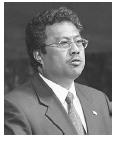PALAU
Tommy Remengesau, Jr.
President

(pronounced "TAH-mee reh-MEN-geh-so")
"As a newly sovereign nation, Palau, in only eight years under the Compact of Free Association, has taken great steps to solidify its new independent status through significant development accomplishments."
The Republic of Palau (pronounced "pull-OW"), is a collection of six island groups located in the western reaches of Oceania about 800 km (500 mi) east of the Philippines and 966 km (600 mi) north of Indonesia. Almost 350 islands form this Micronesian archipelago, but most are tiny and sparsely populated or uninhabited. The Rock Islands, a chain of about 300 small, low-lying coral islands, are known around the world for their great natural beauty. The main island of Babeldaob is the second-largest island in Micronesia after Guam. Distinguished by its high mountainous terrain, Babeldaob accounts for 396 sq km (153 sq mi) of Palau's total land area of 458 sq km (177 sq mi). The capital of Palau is Koror, a small but densely populated island and the political and economic hub of the country. It is connected to Babeldaob and some neighboring islands by a network of causeways. In an effort to relieve pressure on Koror and develop other regions of the country, a new capital is being built in eastern Babeldaob.
Palauans are a Micronesian people, a mixture of Polynesian, Melanesian, and Malayan races. The official language throughout the country is English. Sonsorolese is a second official language in the state of Sonsorol. Palauan is spoken in 13 of the country's 16 states, Anguar and Japanese are spoken in the southern most state of Anguar, while Tobi is the language of the state of Tobi. One-third of Palauans still practice the traditional religion, Modekngei. The other two-thirds of Palauans belong to a variety of Christian denominations. Public education is free and compulsory through the eighth grade. Literacy is high: 92% of the population 15 and older can read and write. The population of Palau was estimated at 19,409 in 2002, but sources give widely diverging estimates ranging from 13,000 to 20,000. It is not clear if any of these figures include the rapidly growing number of immigrant workers, mainly from the Philippines. There are 4,500 to 6,000 of these workers in Palau, many of whom are undocumented.
At present, Palauans enjoy one of the highest standards of living in the Pacific, but this is largely a result of U.S. spending, rather than local economic productivity. Average life expectancy was estimated at 69 years in 2002, and per capita GDP at US $9,000 in 2001. Although Palauans are reputed to be sharp business people, the largest formal sector employer is the government, with a corps of about 2,000 people. In addition to the federal government, Palau is governed by 16 state administrations. The federal government is also the best-paying employer with average annual salaries of US $10,515. This contrasts sharply with the US $1.35 per hour earned by the Filipino immigrants working for the average private sector business. Such opportunities are limited, however, and many educated Palauans now must go abroad in search of jobs and decent salaries.
Many Palauans still practice subsistence fishing and agriculture and produce handicrafts. Palau's principal natural resource is its physical environment, and the fastest growing sector of the formal economy is tourism. Tourism grew from an average of 6,300 persons a year in 1983 to more than 40,000 in 1994. About half of the visitors come from Japan to enjoy scuba diving and snorkeling. Unfortunately for Palau, most of the profits are repatriated by foreign business owners. A second potential source of economic growth lies in exploiting the 322 km (200 mi) exclusive economic zone for its fisheries and undersea mineral deposits. At present, Palau earns some income from the sale of licenses to foreign fishing fleets, and it exports tuna and trochus (a shellfish). As with tourism, however, the vast majority of the wealth generated from fishing leaves the country. Palau also exports copra and handicrafts, but overall export earnings are dwarfed by import expenditures, which account for 80% of Palauan consumption.
ADDRESS
Office of the President
P.O. Box 100
Koror, Republic of Palau
Comment about this article, ask questions, or add new information about this topic: